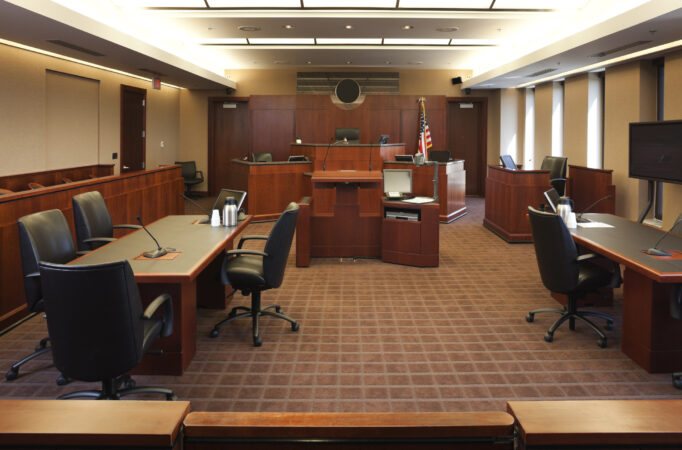Litigation: Latest Legal Blogs and News
Jury Waiver Provision in Franchise Development Agreement Deemed Unenforceable against Non-Signatory Corporate Entities
In Selzer v. Dunkin’ Donuts, Inc., No. 09-5484, 2014 U.S. Dist. LEXIS 46675 (E.D. Pa. April 4, 2014), the U.S. District Court for the Eastern District of Pennsylvania considered whether a jury waiver provision in a store development agreement (the “Agreement”) was enforceable against two non-signatory corporate entities, which were owned by the individual signatories who had signed the Agreement. The non-signatory corporate entities had been formed by the individual signatories in connection with developing franchises under the Agreement. In an effort to enforce the jury waiver provision against the non-signatory corporate entities, the franchisor argued that the individual signatories were acting as agents of the entities when they signed the Agreement. Additionally, the franchisor argued that the non-signatory corporate entities benefitted from the Agreement, which was integral to their claims against the franchisor. The court rejected these arguments.
Noting the dearth of caselaw addressing the enforceability of jury waiver provisions in the Third Circuit, the court began its analysis by reciting the legal standard for waiving a right to a jury trial under the Seventh Amendment–i.e., a knowing and voluntary waiver. Also, the court distinguished the issue before it from the issue presented in cases involving the enforcement of arbitration provisions by or against non-signatories. Specifically, the court explained that, whereas there is a presumption in favor of arbitration, there is a presumption against waiver of a jury trial. As such, cases that address the enforceability of arbitration provisions by or against non-signatories are only instructive to the extent they refuse to enforce arbitration provisions.
Against this backdrop, the court proceeded to analyze the franchisor’s “agency” argument. In rejecting the argument, the court distinguished the authorities cited by the franchisor on the basis that they were inapposite. Specifically, the court distinguished those authorities because the agency relationship was not disputed in those cases. Also, the court questioned the reasoning of one of the cases, which relied upon a case in which a jury waiver provision was enforced by, rather than against, a non-signatory. In doing so, the court cited Third Circuit precedent, which is more reluctant to enforce a provision against, as opposed to by, a non-signatory agent. Accordingly, the court reasoned that the law of the Third Circuit did not allow the jury waiver provision to be enforced against the non-signatory corporate entities.
Next, the court addressed whether the non-signatory corporate entities should be estopped from avoiding the jury waiver provision since they allegedly had benefited from the Agreement. In considering this argument, the court discussed the two theories of estoppel that the Third Circuit has recognized as being applicable in the arbitration context. The first, which is known as “direct benefits” estoppel, applies when a non-signatory benefits directly from the agreement containing the subject provision. The second, which is known as “intertwined claims” estoppel, applies when a non-signatory seeks to bind a signatory because of the close relationship that exists between the entities involved, and the claims involving the non-signatory are intertwined with the contract with the signatory. Under the facts of the case before it, the court found these doctrines inapplicable. The court rejected the latter because it applies only where a non-signatory seeks to bind a signatory, not vice-versa. Likewise, the court rejected the former because the theory of “direct benefits” estoppel in the arbitration context, which is grounded in the presumption in favor of arbitration, cannot be reconciled with the presumption against waiver of the right to a jury trial under the Seventh Amendment. Consequently, the court concluded that the non-signatory corporate entities were not bound by the jury waiver provision in the Agreement.
The full decision can be found here: Selzer v. Dunkin’ Donuts, Inc., No. 09-5484 (E.D. Pa. April 4, 2014).pdf
As a comment, the focus on whether the provision is to be enforced by a non-signatory agent is interesting, especially as applied to jury waiver provisions. In the context of arbitration provisions, the rationale behind allowing a non-signatory agent to invoke the provision against a signatory is that the signatory agreed to arbitrate with the non-signatory agent since the corporate principal can only act through agents. As the Selzer court cautioned, however, it is important to be mindful of the differences between arbitration and jury waiver provision cases due to the different presumptions that apply.
If this is the case, and courts should refrain from looking at cases in which arbitration provisions have been enforced as persuasive authority in the jury waiver context, one might wonder why it is that cases like Tracinda Corp. v. DaimlerChrysler AG, 502 F.3d 212 (3d Cir. 2006), hold “that, when a valid contractual jury trial waiver provision applies to a signatory corporation, the waiver also applies to nonsignatory directors and officers seeking to invoke the waiver as agents of the corporation.” This issue was not squarely addressed by the Selzer court, presumably because the case it was considering did not involve an attempt to enforce a jury waiver provision by a non-signatory agent.
As additional analysis reveals, however, the answer is not entirely clear. In allowing the non-signatory agent to invoke the jury waiver provision against the signatory, the Tracinda court actually cited the reasoning of an arbitration case involving enforcement of an arbitration provision by non-signatory agents as persuasive authority, while distinguishing cases in which the provision was to be asserted against non-signatory agents. Id. at 224 (citing Pritzker v. Merrill Lynch, Pierce, Fenner & Smith, Inc., 7 F.3d 1110 (3d Cir. 1993), which allowed non-signatory agents to invoke arbitration provision against signatory, and Bel-Ray Co. v. Chemrite Ltd., 181 F.3d 435 (3d Cir. 1999), which refused to enforce arbitration provision against non-signatory agents). In an attempt to explain the holding in Tracinda, courts have posited that it represents a narrow “agency” exception to the general rule that jury waiver provisions are unenforceable by non-signatories. See, e.g., Brown & Brown, Inc. v. Cola, No. 10-3898, 2011 U.S. Dist. LEXIS 106838 (E.D. Pa. Sept. 20, 2011); Quinn Constr., Inc. v. Skanska USA, Inc., No. Civ.A.07-406, 2010 U.S. Dist. LEXIS 127091, 2010 WL 4909587 (E.D. Pa. Nov. 30, 2010). Nonetheless, it is worth noting that, although the Selzer court generally cautioned that “cases in which arbitration provisions are not enforced are much more persuasive useful authority than cases in which arbitration provisions are enforced” in the jury waiver context, the Third Circuit has considered the latter in resolving jury waiver issues.
About Us
The litigation attorneys at Houston Harbaugh, P.C., are accomplished business trial lawyers, providing comprehensive support in litigation across a broad spectrum of matters throughout Pennsylvania, West Virginia, Ohio and other jurisdictions upon a special admission basis. Our clients are regional and national small, medium and large companies and individuals who seek well planned and aggressive, but cost effective litigation. We counsel, we budget, we have a deep bench, we act quickly when needed and we have experienced trial lawyers who know the courts and bench. We serve regularly as local counsel for some of the largest law firms in the country when they have matters in this region.

Henry M. Sneath - Practice Chair
Co-Chair of Houston Harbaugh’s Litigation Practice, and Chair of its Intellectual Property Practice, Henry Sneath is a trial attorney, mediator, arbitrator and Federal Court Approved Mediation Neutral and Special Master with 98 trial verdicts and extensive federal and state court trial experience in cases involving commercial disputes, breach of contract litigation, Artificial Intelligence (AI), intellectual property matters, patent, trademark and copyright infringement, trade secret misappropriation, DTSA claims, cyber security and data breach prevention, mitigation and litigation, employment and restrictive covenant litigation, probate trusts and estates litigation, construction claims, eminent domain, professional negligence lawsuits, pharmaceutical, products liability and catastrophic injury litigation, insurance coverage, and insurance bad faith claims. DTSALaw® Business Litigation. Pittsburgh Strong.®

Samuel H. Simon - Practice Chair
As co-chair of Houston Harbaugh’s Litigation Group, Sam focuses his practice on commercial/business litigation. Sam regularly represents clients in the construction, manufacturing, oil and gas, and wholesale/retail/ distribution industries, as well as individuals in matters such as:
- Construction litigation
- Environmental litigation
- Breach of contract disputes
- Oil and gas litigation
- Negligence
- Restrictive covenants (non-compete agreements)
- Civil rights
- Collections/creditors’ rights
- Lease disputes

